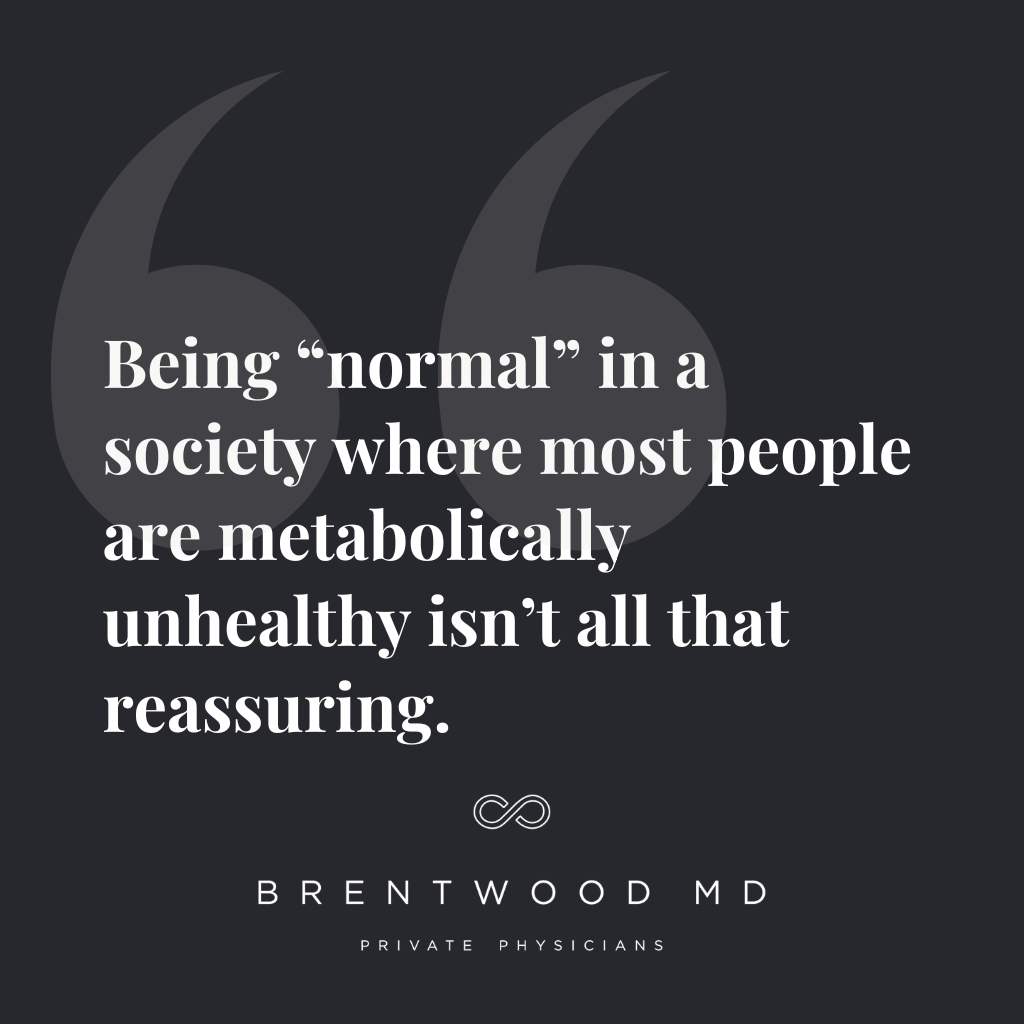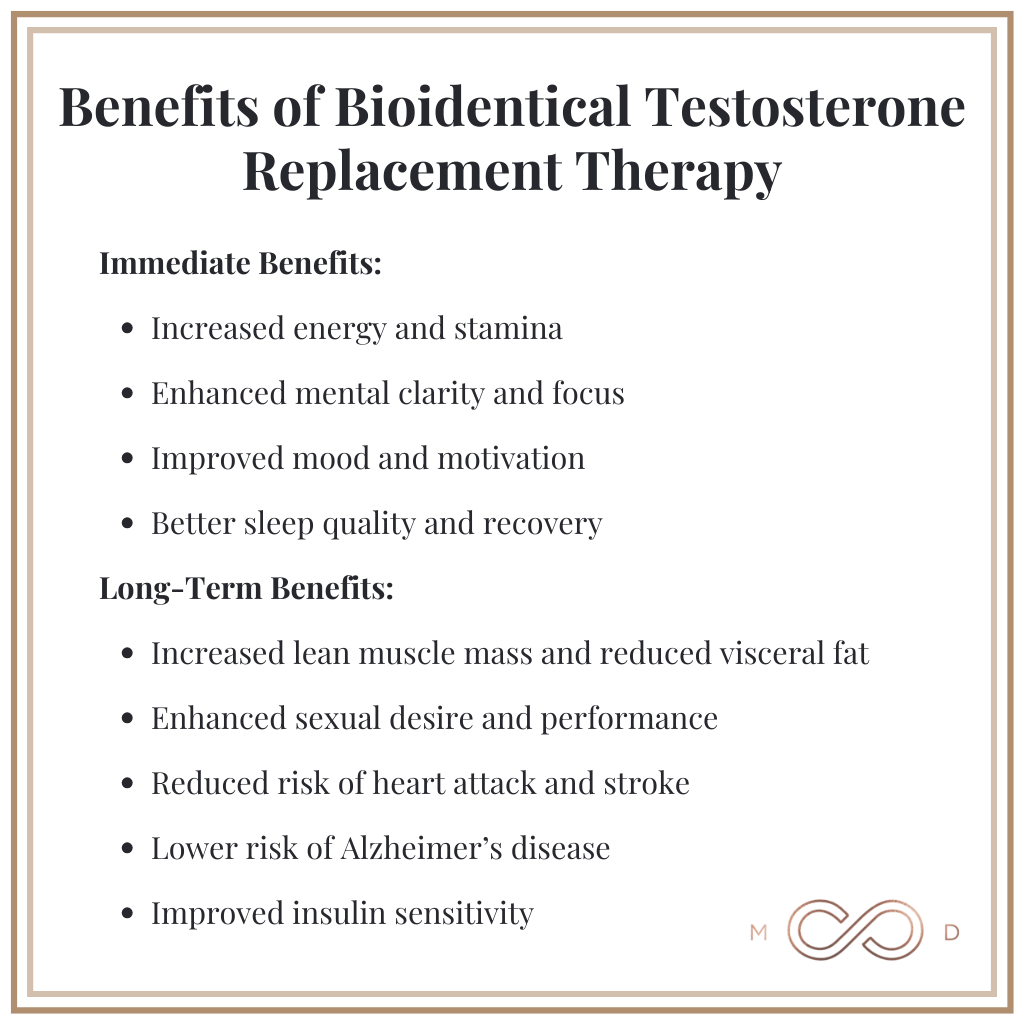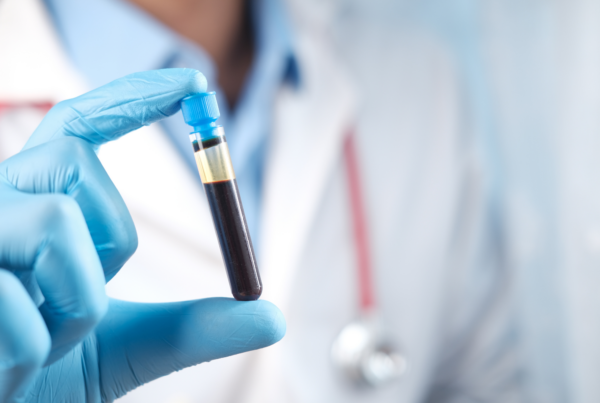Maybe you’ve been struggling with symptoms like brain fog, fatigue, weight gain, or low libido, so you ask your doctor if your testosterone might be low.
When you get the test results back, your testosterone levels stare back at you, sitting squarely in the “normal” range. It must not be your testosterone then, right?
Well, maybe.
If you’re a 50-year-old man, your “normal” testosterone range is calculated from the testosterone of other 50-year-old American men. But the average 50-year-old in this country today isn’t exactly a beacon of optimal health. Research shows we’ve reached a point where only 12% of US adults are metabolically healthy, without evidence of conditions like insulin resistance, metabolic syndrome, or diabetes.
Being “normal” in a society where most people are metabolically unhealthy isn’t all that reassuring.
To sort this out, let’s talk about the role of testosterone, total and free testosterone levels by age, and why “normal” isn’t good enough.
Total and Free Testosterone Levels by Age: The Peak Performance Window
Think back with me to a time when you felt like you could conquer the world. For most men, that window opened somewhere between the ages of 20 and 25. You had energy that seemed endless, mental clarity that cut through any challenge, and physical strength that made everything feel effortless.
That wasn’t just youth talking. That was your hormonal environment operating at peak performance.
Total and free testosterone levels reach their highest point during this period, and everything works as nature intended:
- Muscle builds easily
- Fat burns efficiently
- Motivation runs high
- Sexual desire and function perform optimally
- Recovery happens virtually overnight
Understanding Total vs. Free Testosterone
When evaluating your testosterone levels, you need to understand the difference between total and free testosterone.
Total testosterone represents the overall amount of testosterone in your blood, both bound and unbound to proteins.
Free testosterone is the portion of your total testosterone that’s not bound to proteins, so it’s immediately available for your body to use. This represents only about 1–2% of your total testosterone, but it’s the fraction that actually drives the benefits you experience.
Free testosterone is often a better predictor of symptoms because it represents the hormone that’s actively working in your cells. You can have total testosterone in the “normal” range but still experience low testosterone symptoms if your free testosterone is suboptimal.
The Steady Decline in Free Testosterone With Age: What Happens After 30
Here’s where the story takes a turn that most men don’t see coming.
After age 30, total testosterone begins a relentless decline of around 1–2% every year, but free testosterone levels drop even more — about 2–3%, according to some studies. That might not sound dramatic, but compound this decline over two decades, and you’re looking at testosterone levels that are 40–60% lower than your peak performance years.
“Normal” ranges for free testosterone levels by age vary depending on which lab is doing the testing, but by the time men reach their 60s, more than 20% have free testosterone levels below even the “normal” range for their age group. After 80, that number jumps to 50%.
These aren’t just numbers on a lab report. Free testosterone decline directly correlates with many symptoms men experience but often attribute to inevitable aging: decreased energy, stubborn weight gain, brain fog, reduced muscle mass, insulin resistance, depression, and yes, declining sexual performance.
Why “Normal for Your Age” Is a Misleading Standard
When your doctor tells you your free testosterone levels are “normal,” they mean in comparison to everyone else in your age group. But the fundamental flaw in this approach, as mentioned, is that normal ranges are established by averaging the hormone levels of men in each age bracket.
So, if you’re 55 years old, your “normal” range is determined by averaging testosterone levels from a bunch of other 55-year-old men — many of whom are dealing with the metabolic dysfunction, chronic stress, and declining health that characterize our modern lifestyle.
This creates a race to the bottom. As the general population becomes less healthy, “normal” ranges shift downward to accommodate declining standards.
Think about it this way: If you wanted to optimize your car’s performance, would you compare it to the average beat-up vehicle in a junkyard? Or would you benchmark it against what that car could do when it was running at peak efficiency?
The Optimal vs. Normal Conversation
How amazing would it be to take a 50-year-old with all the wisdom and experience they’ve accumulated and ignite that wisdom with the hormonal environment they had when they were 25? That’s the difference between settling for “normal” and aiming for “optimization.”
When a 50- or 60-year-old feels 25 again hormonally, the results are remarkable.
This is why I encourage men to look beyond age-adjusted “normal” ranges and instead focus on optimal ranges — the free testosterone levels that supported your peak performance, energy, and vitality at an earlier age.
In my practice, I optimize total testosterone to a level of 1000–1200 ng/dL, with free testosterone levels targeting the higher end of what younger men naturally produce (150–225 pg/mL). We’re not trying to create superhuman levels here; we’re simply trying to restore what your body was designed to achieve when functioning at its best.
The Question of Testosterone Replacement Therapy
When we restore total and free testosterone to optimal levels rather than settling for “normal,” patients experience profound improvements:
Immediate Benefits:
- Increased energy and stamina
- Enhanced mental clarity and focus
- Improved mood and motivation
- Better sleep quality and recovery
Long-Term Benefits:
- Increased lean muscle mass and reduced visceral fat
- Enhanced sexual desire and performance
- Reduced risk of heart attack and stroke
- Lower risk of Alzheimer’s disease
- Improved insulin sensitivity
You may have heard certain myths about testosterone replacement therapy, such as an increased risk of heart attack or the need to give blood regularly. But when done properly with bioidentical hormones, testosterone replacement therapy is actually protective in many areas — such as heart health — offering significant health benefits with minimal risk.
Note: While this post focuses on testosterone optimization for men, women with suboptimal levels may also benefit from hormone therapy.
Optimizing Free Testosterone Levels by Age: Your Next Steps
If you suspect “normal for your age” isn’t working for you, take these proactive next steps:
Consider Your Symptoms: Are you experiencing fatigue, weight gain, brain fog, reduced libido, or declining strength? These symptoms matter more than lab ranges when determining if you might benefit from optimization.
Find Your Team: Work with a physician who understands the difference between normal and optimal hormone levels. You need someone who won’t just manage disease but will help you achieve your best possible health.
Get the Right Tests: Request both total and free testosterone levels from your physician. Don’t just ask if your levels are “normal” — ask for the actual numbers and where they fall within the reference range.
Evaluate Your Overall Health: Lifestyle matters. Testosterone optimization works best when combined with proper nutrition, regular strength training, stress management, and quality sleep.
Free Testosterone Levels by Age: Final Thoughts
You can’t turn back the clock on your wisdom and experience (nor would you want to), but you absolutely can restore the hormonal environment that made you feel unstoppable at 25.
When considering free testosterone levels by age, don’t settle for “normal” for your peers. You deserve to feel like the best version of yourself, regardless of the number of candles on your cake. The science exists, the treatments are available, and the results speak for themselves.
Your peak performance years don’t have to be behind you. Don’t be afraid to schedule a consultation with a knowledgeable physician. Your future self will thank you.

Dr. Aaron Wenzel is a concierge physician specializing in the care of fast-moving entrepreneurs, executives, and public figures in the Nashville, TN area. Dr. Wenzel’s diverse life experience and extensive training in family medicine, emergency care, nutrition, and hormone replacement therapies give him the unique platform to provide unmatched care for his patients.









